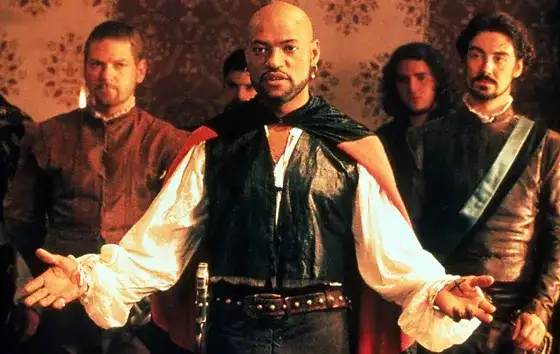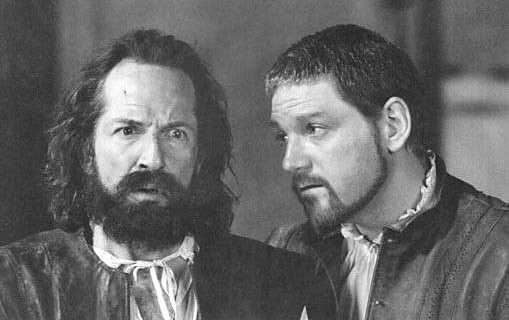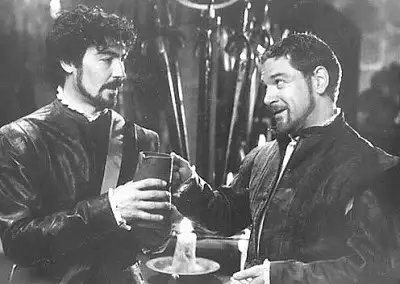Iago – The Perfect Villain

William Shakespeare`s Othello is a tragedy based on the retaliation between two characters, Iago and Othello. Othello, the protagonist of the play, is a widely respected general of the armies of Venice and Iago is Othello`s ensign who pretends to care.
Iago is Shakespeare’s most interesting and complex villain; he not only deceives people or steals from them, he also kills to get what he wants. The most striking aspects about his character is his complete lack of remorse for the pain he inflicts on others and the complex manner in which he justifies his actions; he comes across as someone who takes pleasure in the chaos he creates.

The Root of His Evil
Shakespeare gives Iago`s character depth, which makes him an utterly compelling and intriguing character – he becomes the villain that readers love to hate. To fulfil the plot of the tragedy, Shakespeare depicts Iago as the epitome of evil; he accomplishes this by highlighting Iago`s peculiar character traits, his split personality, and his deceitful nature through his soliloquies.
At the beginning of Act 1, Iago tells Roderigo that he hates Othello because he appointed Cassio instead of him as lieutenant. His first soliloquy appears in Act 1 Scene 1, line 149. Here Iago does not justify why he is plotting against Othello; he only mentions that he hates him even though his current situation requires that he pretend to care for him.

At the end of Act 1, Iago justifies his actions against Othello. He first says that he would not spend time with Roderigo “But for my sport and profit”(Act 1.3, line 387). This highlights that he sees his manipulation of people as some kind of game from which he may benefit something. He goes on to explain his other reason for hating Othello.
“I hate the Moor; And it is thought abroad that twixt my sheets He’s done my office. I know not if’t be true; But I, for mere suspicion in that kind, Will do as if for surety”.
Othello, Act 1 Scene 3, line 387
He uses the rumors about Othello having slept with his wife as an excuse for hating Othello; however, his suspicion of Othello sleeping with his wife is simply an afterthought that he uses to justify the hatred that already exists.
In his third soliloquy, Iago once again comes up with other reasons for destroying Othello. He now says in Act 2 Scene 1, line 292 that he too loves Desdemona, not totally out of lust, but partly because he would love to get revenge on Othello because he suspects that he has been sleeping with his wife, Emilia.

Though he does not have concrete evidence, the idea that Othello might have slept with his wife “Doth, like a poisonous mineral, gnaw my innards”(Act 2.1, line 298) makes him want to punish Othello who he said is of a “free and open nature” (Act 1.3, line 400). Iago wants Othello to feel the same jealousy and paranoia that he feels. Iago also tries to justify his effort to bring Cassio down, saying that he suspects that he too might have slept with his wife. Perhaps it would be believable that Othello had slept with Emilia, but Iago then casually suggests that Cassio may have also slept with her, again being suspicious without concrete evidence.

The Villain in Him
At the end of Act 2, Iago begins his soliloquy by casually stating that he is not a villain; the sarcasm reveals much about his character. “When devils will the blackest sins put on, They do suggest at first with heavenly shows, As I do now.” (Act 2.3, line 345). Until this point, Iago had been pretending that he believed he was acting justly. In this soliloquy, readers can clearly see that Iago is taking pleasure in his deceitful plans. Iago’s utters his final soliloquy while Roderigo is trying to kill Cassio. He gives another reason for wanting Cassio dead; he says, “If Cassio do remain, He hath a daily beauty in his life That makes me ugly.”(Act 5.1, line 18) Here, he mentions that Cassio`s kind nature is the reason he wants him dead because it makes him (Iago) look bad.

In his final two soliloquies, he acknowledges that he is a villain, and in the end, he shows no remorse for this. Though throughout the play, he mentions numerous reasons for his villainy, he seems to be taking pleasure in being deceitful first and only concerning himself with reasons afterwards.
Iago’s Persona
Iago is cruel, subversive, and aggressive. He is manipulative, he kills, steals, and he even plays tricks on people in order to trap them. The soliloquies help Iago to buy sympathy from readers. Shakespeare uses the soliloquies an instrument to engage readers – he makes the audience fall in love with Iago before shaping him into an evil person. Shakespeare turns Iago into a “perfect villain”, unlike other Shakespearean villains who are a one-dimensional character throughout the play. Iago is mysterious and unpredictable; for every wrongdoing, he finds a way of justifying it. In some instances, the reader might even believe that he is actually the victim who is rightfully defending himself.

The character of Iago has many layers; one could delve significantly deeper into his nuances and personality. However, it is undeniable that Iago plays the main role Othello. Iago is a villain that has fascinated audiences for centuries. At the end readers are left without fully understanding the reasons behind the tragic conclusion. They are left unsatisfied yet intrigued by Iago, a being who remains enigmatic for eternity.
Dealing with The Villain
Iago has a shrewd two-dimensional character; his goal throughout the play is to bring down the Moor. Iago shows how far an individual will go in order to disrupt the happiness and success of their enemy. He pursues his attacks on his victims through covert ways and despite being able to differentiate between right and wrong, Iago still chooses the latter. Throughout Othello, his (Iago) evil plans go unnoticed; this makes it evident that humanity is prone to evil, regardless of an individual`s environment.
Iago is the epitome of evil; therefore, understanding how he operated can help readers/the audience to identify villains in their own lives and protect themselves from suffering the same fate as Othello, Emilia, Cassio, Roderigo, and Desdemona. Humanity has always been powerless against tactically devious individuals such as Iago; therefore, we have to keep in mind that for as long as power hungry narcissists such as him exist there will always be a tug of war between good and bad – we just need to know how to deal with such situations.
As M. Scott Peck once said,
“The whole course of human history may depend on a change of heart in one solitary and even humble individual – for it is in the solitary mind and soul of the individual that the battle between good and evil is waged and ultimately won or lost.”
What do you think? Leave a comment.











A great character analysis for a great villain protag. Truly the archetypical hater. Because why did he need to be so petty over a promotion.
Thank you
Anything that comes out of Iago’s mouth should be taken with a shovelful of salt.
The reason Iago’s such a great villain and remains so is because he’s someone we all meet in our lives; a trusted friend who stabs us in the back then twists the knife. Sociopaths and psychopaths who won’t hesitate to ruin our lives for no reason at all, or at least, one we don’t understand. That is something that transcends all cultures; the ultimate betrayal.
I’m still fascinated by Shakespeare and Iago is such an interesting character. Maybe one of my favorites.
Iago is truly a horrid character. I think he is truly a serpent of which every “bad guy” in today’s world strives to be. He twists the truth, to merrit his own divices. He makes a mockery of all that is good. He unmoral above all others in English literature. He is a… villian…
I like him i hate desdemona and othello.
I’ve always hypothesised Iago does what he does not because he inherently wants to do evil, but rather he is logical to the point where he disregards morals.
That’s called being a psychopath. And obviously it’s not logical sense it ended in his death, unless you think his dying was logical.
Iago is a SOCIOPATH, NOT a psychopath. There’s a huge difference. One is born and the other is made. Iago became a sociopath partly because of what he had to endure as a military man, and partly because of how Othello completely undermined him. I believe that Othello undermining him was the final straw on the camel’s back. He is NOT inherently evil. That would make him to be too boring and one-dimensional of a character. He is someone who has been turned due to terrible circumstance.
His racism is definitely an issue, and probably something that Shakespeare wanted to bring light to. It wasn’t a problem to Iago, nor even a thought, until he was undermined and over-looked.
You got the difference between socio and pyscho wrong. Psychopaths are simply manic people. They can be blabbering mad to the point of incoherency.
Sociopaths are still wholly sentient in the way that they wont act super far from the normal way other folk do, but they lack empathy.
Anybody who has to ask what motivates lago to act as he does has very little experience of certain areas of humanity. l’ve known people that have acted in completely over the top ways at the slightest thing and, whilst they couldn’t explain why they do it, it certainly is an aspect of human behaviour and not a rare trait.
I think Iago is intended to represent Thomas Cromwell, the favored and trusted minister of Henry VIII. Cromwell worked tirelessly on Anne Boleyn’s downfall via false charges of adultery. Henry abandoned Anne at a jousting match because he believed she dropped her handkerchief to tacitly encourage a lover. Anne’s daughter Elizabeth I was a great patron to Shakespeare. The whole play portrays Desdemona (Anne) as a faithful, innocent wife and Othello (Henry) as an honorable warrior led to doubt his wife’s honor and his closest friends.
My opinion is that what makes him such an exceptionally brilliant villain, is that he’s basically Shakespeare’s Joker: a figure whose malicious nature defies any realistic psychological nature and is more of a mythical manifestation of evil. NO ONE does, WHAT IAGO DOES, when they feel like someone else was promoted instead of them, or they don’t trust their wife, especially since Iago is about 10x as smart as all the other characters. He’s addicted to his own hatred.
I’ve always thought that the most villainous part of Iago’s role is the way that it has embedded itself into the popular psyche. Othello’s character, as a bigoted portrayal of black masculinity, has a long interwoven history with colonial and white supremacist thought, and it is this aspect which makes Iago really terrible for me – his influence extends beyond the stage he plays on. I liked your analysis overall though, and particularly the focus on soliloquies as a window into his character’s motivations.
Thank you
Great article
Thank you very much 🙂
The first Iago I ever saw was Paul Rogers (now forgotten?) on BBC TV in 1955. He was the best I’ve ever encountered. Until now — Stratford 2015. Lucian Msamati’s Iago and Hugh Quarshie’s Othello, working together, have transformed this play. Iago doesn’t have to a be psychotic, nor the devil. At last he makes sense as a frightened, noisy, ordinary man; and Shakespeare’s up there somewhere clapping and saying, ‘So THAT’s it! Of course!’
Interesting piece. Ian Serkin at Manchester Royal Exchange a decade ago opposite Joseph Paterson was one of the best I’ve seen.
Thank you
Chiwetel Ejiofor as Othello at the Donmar was utterly wonderful, the best I’ve seen.
I’m rather fond of the interpretation that Shakespeare wrote Iago as a depiction of the devil, or at least of evil, but that this was rather too subtle for his audience and so he went on to write Macbeth, where the supernatural evil was more explicit.
It’s funny how I find myself irritated by the attempts to humanise and rationalise Iago. It really just goes to show how much one can become attached to one’s own pet-understandings of the text, when in fact the richness of Shakespeare’s work is very much open to these different approaches.
The best analysis of Iago I have seen online.
Thank you very much
You saved my English essay. =)
I’m glad I could help
Just finished watching Othello in class and this really helped me to write up a character analysis for revision. Thanks!
I’m happy my writing helped you
Iago is such a terrifying villain. He doesn’t even think he is a villain.
Iago. One of the most evil dudes outside of Lucifer I’ve witnessed speak. Listening to him raises great sorrow and anger and pity all in my mind at once.
Iago has all the motivations. Jealousy, sexism, racism, sexual repression, sociopathy are all there and I would add a will to dominate through the lens of machismo.
Iago is pure evil.
Thank you for this, it really helped me understand his character better.
I’m glad I could help you
Iago hates Othello, because he thinks Othello slept with his wife. And I think he’s not happy with his social status as a common soldier. Which Casio makes fun of him for. I quote Casio “you shall relish him in a common Soldier rather than a scholar.”
He doesn’t actually have a motivation— that’s what makes him so disturbing.
Fantastic analysis. So a lot of actors who have played iago have stated that they believe iago’s immense hatred for othello stems from his love for him. We can look at it homosexually or a brother to brother relationship that many men in the army feel as they fight together. When othello gives the position of lieutenant to cassio, iago is hurt and he turns this love into hatred. It is important to question when looking at iago’s motives how a man who lies, decieves and manipulates has gained a reputation of honestly from everyone. he was likely not born bad but made bad. Iago is working class, othello, roderigo and cassio are upper class so othello gave a position which would have elevated iago into the upper class to cassio. Perhaps his motivation stems from his position as the broken proletariat angry at how other characters see him as socially inadequate – “the lieutenant would be saved before the ancient” (Cassio when he is drunk).
He wants Othello destroyed.
Kenneth Branagh is bloody brilliant. the most amazing performance of Iago i’ve ever seen, including theatrical adaptations. i didn’t like this version of Othello at all, but his role alone is worth going through the rest of the painfully shallow scenes.
Iago is such an evil bastard, yet he knows it and loves it. One of the all time great villains.
I’m going to start doing Shakespearean cosplay.
I found Iago’s final actions to be his most intriguing act of villainy. His choice to stay silent at the end of the play is a punishment to both the other characters and the audience, as we too want to know what his true motives were, to gain insight into his twisted yet clever machinations. It’s interesting that although Othello is a Shakespearean tragedy, an important character remains alive at the end of the play, and his final moments, much like his thoughts, will remain forever in obscurity.
We’ve just started Othello in our drama school so this is rather helpful; keep it up!
Happy to help
This character is by far the most evil of all of Shakespeare.
Some men die for glory, some men fight for love, but this man lives for revenge.
Personally I’ve never seen him as being evil. To me he was a good soldier and comrade-in-arms of Othello, who suddenly finds himself passed over for promotion, displaced in Othello’s affections by both Cassio and Desdemona. His world is unravelling and he feels powerless to stop it. He loses it in a “Falling Down” kind of way. Paranoia takes hold, he even begins to suspect his wife. Decent men can easily become monsters under such strain.
To me, Othello is the most accessible of Shakespeare’s tragedies. We can all see a little of the characters in ourselves or those we know. Everyone knows how reputations can be destroyed on the flimsiest of evidence; how jealousy and suspicion feed on the heart; how innocence and virtue can be easily slandered; how persuasiveness and gullibility interact to destroy people; and how lies always get you in the end.
I agree that Iago is one of the most interesting villain figures of Shakespeare’s repertoire. I would have mentioned his explicit racism and jealousy too: his hatred for Othello is partly due to the fact that Othello is black and in a higher military position than him.
Interesting take
Thanks
I have always loved Iago. He’s such a slime.
I find othello one of the most powerful works ever written, and iago certainly one of the most chilling characters. even now after so many serial killers and slashers, iago has the ability to give readers and audiences the creeps big time.
Very great analysis
Thanks for reading the article
Thank you for reading the article
Really interesting to read. You definitely know your stuff and took the time to lay out a salient argument. I liked Iago for the same reasons you said– he’s cruel and unforgiving but fleshed-out and dynamic in a way that many modern-day villains aren’t. Thanks!
This reminded me of how much I loved reading Othello, and it was a great analysis of Iago!
Evil is about putting your own interests above everyone else’s. This often leads to alienating people, but if you’re charismatic enough, you can manipulate people just long enough to get what you want. If you’re okay with being utterly alone in the long run, evil is a great way to get what you want.
Only problem is if there’s someone stronger than you that cares about punishing evil, like a superhero, or the writer of your story, or God.
The author effectively examines Iago’s personality, justifies his motives, and highlights his cruel and manipulative nature throughout the play. The article’s strength lies in its thorough analysis of Iago’s soliloquies, which provides insight into his true motives and persona. The author accurately captures Iago’s complicated character and the different layers that make him the perfect villain. The author’s language is precise and easy to understand, making it accessible to a wider audience.
However, the article could have benefited from a deeper analysis of the historical and cultural context of the play, which would have provided a more comprehensive understanding of Iago’s character. Additionally, it would have been interesting to see a comparison of Iago to other Shakespearean villains, as this would have highlighted his uniqueness and the reasons for his villainy.
In conclusion, the article provides a well-written analysis of Iago’s character, his motives, and his actions throughout the play. The author’s thorough examination of Iago’s soliloquies makes the article a compelling read, and the language used is clear and accessible to a wide range of readers. However, a deeper analysis of the play’s historical and cultural context and a comparison of Iago to other Shakespearean villains would have enhanced the article’s overall analysis.
For me, Iago’s pervesity is more in the way he does it than in the act itself
This was an awesome article! I just recently read “Othello,” and I completely agree with your anaylsis of Iago. In a way, he almost reminds me of Lady Macbeth–both being incredibly maniplative, deceitful and cruel villains. But Iago seems to bring these pitfalls to new heights in how deeply engrained deceit has become in his being. My Professor pointed out that one of his most shocking lines is “I am not what I am,” a true testament to the fact that he is willing to become whatever he must be to attain power–even if it is at the cost of his own sense of identiy, and humanity.
Iago has always been one of my favourite literary villains- he inspired so much! I’m rather fond of the notion that he’s representative of the snake in the Genesis bible story- a complete shade of grey.
Two interesting appropriative film adaptations of Othello: O (2001), with Julia Stiles (beautiful and talented), and director Geoffrey Sax’s Othello (2001).
Great analysis of Iago! I agree with your argument about how Iago always justifies himself afterwards.
It’s often thought that the play is about jealousy and its destructive power, and Othello is the byword for jealousy. But-as your character analysis shows- it is Iago, not Othello, that is the demon of jealousy personified. Jealousy also becomes the central theme around which the plot unfolds.
I have many encounter people surrounding me here in philippines like IAGO ability, they are hungry of power.